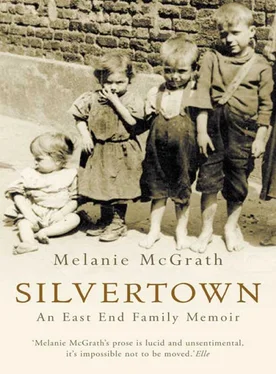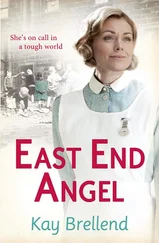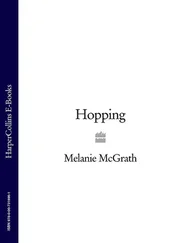The second room is much smaller, little more than a box really, and houses another horsehair mattress which has to be shaken of its bedbugs every morning and rolled into a bolster to serve as a seat and a table. All but the youngest of the children, as well as an older female cousin, sleep on this mattress, and though the room has no fire, its small size and busy population keep it warm. In keeping with their relative sizes, Frenchie and Sarah’s room is known as Main Room and this second room Little Room. On occasion, when there is no money for coal or even for a bucket of coal dust, the whole family is obliged to move into Little Room just to keep from freezing.
Downstairs live another family, the Smileys – Jack, Violet and their nine or so children, the number varying according to whether there is a new arrival that year to balance the one or two carried off by the whooping cough or TB. The Smileys are permanently unlucky. If there is a bout of pneumonia going around, then one of the Smileys is bound to get it. If a neighbour’s boy runs amok with a football, then it will be the Smileys’ window which gets broken. If the vicar is doing his rounds, he’ll always knock first on the Smileys’ door.
Jack Smiley works as a hatchman in the East India and his wife takes in washing and sometimes cleans the ships’ galleys at the East India, but it is never enough. The tallyman is a regular visitor at the Smiley residence. So is the rent collector. And the bookies’ boy. Every Monday morning you can set your watch by the appearance of the Smiley children lumbering up the pavement carrying the family sheets and coats to Nathan James Ltd, outfitter and pawnbroker, where they will remain until Friday payday.
The Smileys and the Fulchers share a small concrete back yard with a privy and a standing tap, from where the Fulchers take their water. The privy is a dirty business. In the summer the smell draws egg-filled bluebottles and in the winter the wind sneaks in and freezes their buttocks to the seat. At some point during the previous decade the privy door worked part-way off its hinges leaving a gap the size of a toddler’s hand. But for all that, the plumbing is solid, there are rarely any overspills or seeping pipes, and most of the rats stay away. For those that don’t, the Smileys’ liver-coloured mongrel Bobs does a grand job of disposal, leaving rat tails and other remnants about as proof of his efficacy.
Frenchie Fulcher works as a ships’ carpenter at Thames Ironworks on Bow Creek, and sometimes at the West India dry dock. He is a journeyman without a permanent job and has to shape up each morning before seven in the hope that the foreman at the Ironworks has room for him. If not, he’ll go down to the West India and try to pick up something there. Fulcher is not a heavy man. All the same, he is an angry man and his neat little body conceals the strength of horses. Among dockers with their sloping shoulders, their rickety legs and half-broken backs, Frenchie the carpenter appears upright and dignified. His manner, too, sets him apart. Men less fastidious than Frenchie go to lengths at shape up, laying on their Irish/Polish/Scots origins and playing the blue-eyed boys. But French is above all that. If there is no work on any particular day, he will go home empty-handed and take it out on the kids. He is proud that way.
On a day when he is feeling right with the world Frenchie looks almost regal. His features are neat and well-made: a slender nose, domed a little in the middle but with a thin pinch at the end; wide-set, peaty eyes with a good measure of white in them, the kind of eyes in which daydreams have space to hide; and a generous but not excessive forehead – a testament, so Sarah says, to his good blood. His voice is high but his laughter, when it comes, is unexpectedly deep and clanging, not unlike an anchor dropping on its chain.
Sarah Fulcher is Frenchie’s opposite, a coarse-grained, flap-fleshed woman of wholesome temperament. She is pliant and sweet, with no obvious vices and a handy array of virtues ranging from dressmaking to midwifery. Most important of all, Sarah Fulcher is thrifty. She can sniff out a rotten swede or a poor potato at ten yards. No Chrisp Street costermonger will dare to slink a slimy cabbage or dud carrot into Sarah’s bag because they know her shrieks of latherish rage will echo halfway to the Thames Estuary. Taking money from Sarah Fulcher’s hand is as hard as prising the ring off a rigor mortised finger.
This small reservoir of fierceness is all the more remarkable because in other ways Sarah Fulcher is soft as snow. Her skin is soft and her hair is soft. Her ears have a wispy bloom of hair and fudgy lobes. Her body is as spongy as sausage meat, her lips as plump as spring chicks. Her disposition, too, is spring-like, fresh, sunny and innocent. A little insensitive, even undigested, but never, ever cruel. So sweet is she that the Smiley children all wish she were their mother, because, unlike Mrs Smiley, Sarah only thumps her children when she can’t think of any other way to make them do what they are told.
Sarah’s love for Frenchie is sweetly naïve and unshakeable. Her life is divided into two eras: Before and After Frenchie. Before Frenchie, Sarah Quelch toiled in a scullery for a family Up West. The family was miserable and the scullery was worse. Then Sarah met Frenchie, married him and found herself living in the bright new world of After Frenchie. In the wide open spaces of Sarah’s mind Frenchie is a kind of a god, or at the very least, a saviour. So unquestioning is Sarah’s devotion that she seems not to sense her husband’s deep sighs, his eyes rolled to the heavens. In an obscure corner of his heart Frenchie resents her. Resents his children, too. The wastefulness of them! The toiling that has to be done to keep them all from the poorhouse. Without Sarah and her brood of guzzling children just think where Frenchie might have ended up! As the owner of a timber yard, perhaps, or a chandler’s, or a leather business, or even a cabinetmaker’s shop. Occasionally, when he has had too much to drink, he’ll give voice to his disappointments, but Sarah only smiles at that and blows him a kiss and says, San Fairy Ann, dear, San Fairy Ann, and he will give up trying to explain.
Sarah gives birth to seven children: William, Rosetta, Frances Maud, John, Jane, Edith and Arthur. The eldest, William, is born premature and doomed. He survives for two days and his body is buried without ceremony in the cemetery not far from Ullin Street. (Rosetta does not grow to adulthood either, but we’ll come back to her.) William is never mentioned and the remembrance of him surfaces only occasionally as a faraway look in Sarah’s eye or a twitch on Frenchie’s face, and so Jane is born into a family with a missing part. No photograph of William exists, no sketch or representation of any kind. It is almost as though his very absence is shameful and must not be acknowledged. But acknowledged it is, of course. When Jane is about five or six, she comes across a wooden soldier wrapped in a piece of old sheeting and hidden at the back of the cupboard beside the fire. It is a beautifully carved, old-fashioned kind of soldier with painted eyes and woollen hair and a red wooden jacket around his broad shoulders and Frenchie’s mark carved into his base, and from then on the soldier is William, a little wooden brother who lives in a cupboard and will never grow up.
The Fulcher children are not the most handsome brood. Edie gets most of the looks: arched eyebrows, deep blue eyes and a mouth made from strawberry jam. Jane’s older sister Frances Maud, her older brother John and younger brother Arthur are like their mother, squashy and bovine and big-nosed. Only Rosie and Jane take after their father, though Rosie has inherited her mother’s soft outlines. By contrast, Jane is a tiny, reedy thing, with bones as skinny as a shrew’s. A meagre, curved nose juts from cheeks that would these days be prized, but in those days simply emphasised her thinness. The zooming eyes are a lively blue, though apt to be inspecting. The teeth are good and even. There is nothing wrong with any of her features. It’s just that when put together they are uneventful.
Читать дальше












